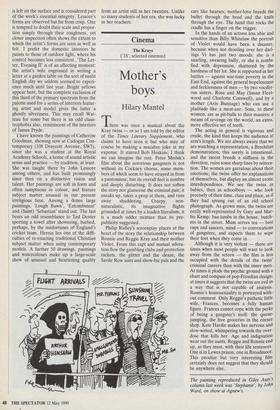Cinema
The Krays (`18', selected cinemas)
Mother's boys
Hilary Mantel
There was once a musical about the Kray twins — or so I am told by the editor of the Times Literary Supplement, who claims to have seen it but who may of course be making a macabre joke at my expense. It starred Bob Hoskins; I think we can imagine the rest. Peter Medak's film about the notorious gangsters is not without its Cockney chorus, some mem- bers of which seem to have strayed in from a pantomime; but its overall feel is sombre and deeply disturbing. It does not soften the story nor glamorise the criminal pair; it sneaks up, takes a peep at them, and runs away shuddering. Creepy, non- naturalistic, its imaginative flights grounded at times by a leaden literalism, it is a much odder mixture than its pre- publicity suggested.
Philip Ridley's screenplay places at the heart of the story the relationship between Ronnie and Reggie Kray and their mother Violet. From this rapt and mutual adora- tion flow the gambling clubs and protection rackets, the glitter and the sleaze, the Savile Row suits and show-biz pals and the cars like hearses; mother-love breeds the bullet through the head and the knife through the eye. The hand that rocks the cradle has a finger on the trigger.
In the hands of an actress less able and sensitive than Billy Whitelaw the portrait of Violet would have been a disaster, because when not drooling over her darl- ings Vi has just two moods: she is a snarling, swearing bully, or she is zombi- fied with depression, shattered by the hardness of her lot. She is supported in her battles — against war-time poverty in the East End, against the general hopelessness and fecklessness of men — by two vocifer- ous sisters, Rose and May (Susan Fleet- wood and Charlotte Cornwell), and by a mother (Avis Bunnage) who can use a platitude like a meat-axe. Sons, to these women, are as pit-bulls to their masters: a means of revenge on the world, an extra, more effective set of teeth.
The acting in general is vigorous and crude, the kind that keeps the audience at arm's length. We are always aware that we are watching a representation, a Brechtian demonstration; this surely is intentional, and the intent breeds a stiffness in the direction, ruins some sharp lines by reitera- tion. The women are garrulous about their emotions; the twins offer no explanations of themselves, but display an almost erotic interdependence. We see the twins as babies, then as schoolboys — who look precisely of their time, class and place, as if they had sprung out of an old school photograph. As grown men, the twins are eerily well-represented by Gary and Mar- tin Kemp: baa-lambs in the house, butch- ers in the street. Mum serves tea — best cups and saucers, mind — to convocations of gangsters, and expects them to wipe their feet when they come in.
Although it is very violent — there are times when most people will want to look away from the screen — the film is less occupied with the details of the twins' criminal careers than with the inner men. At times it plods the psychic ground with a chart and compass of pop-Freudian design; at times it suggests that the twins are evil in a way that is not capable of analysis.
Ronnie's homosexuality is portrayed with- out comment. Only Reggie's pathetic little wife, Frances, becomes a fully human figure. Frances cannot cope with the perks of being a gangster's moll: the queue- jumping, the free groceries in the corner shop. Kate Hardie makes her nervous and slow-witted, whimpering towards the over- dose that kills her. Age and indignation wear out the aunts. Reggie and Ronnie end up, as they must, with their life sentences. One is in Lewes prison, one in Broadmoor. This peculiar but very interesting film certainly does not suggest that they should be anywhere else.




























































 Previous page
Previous page